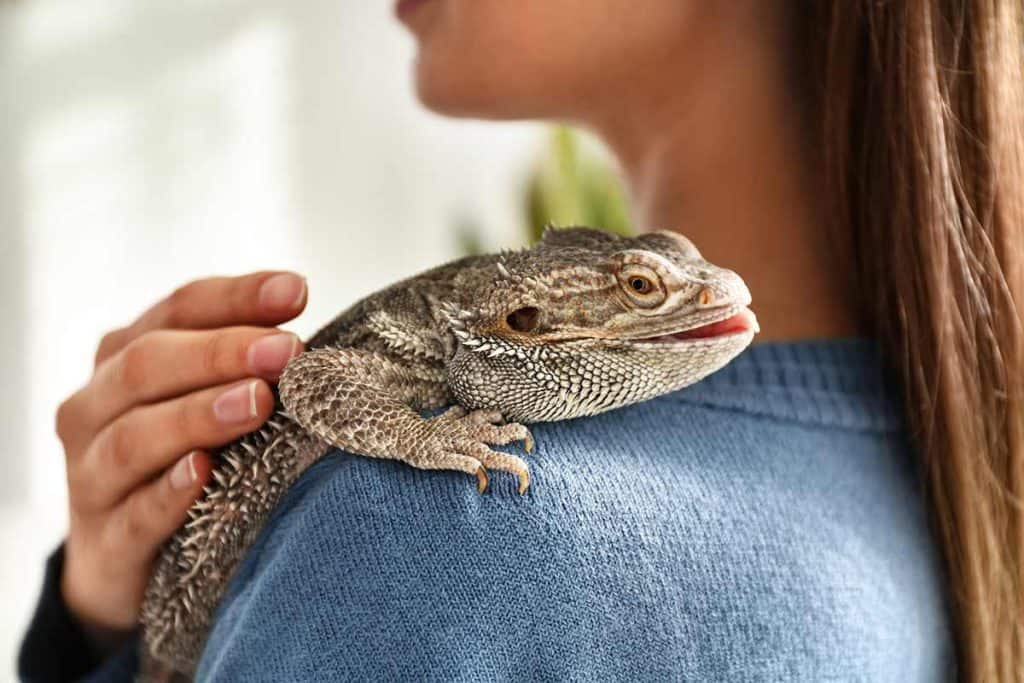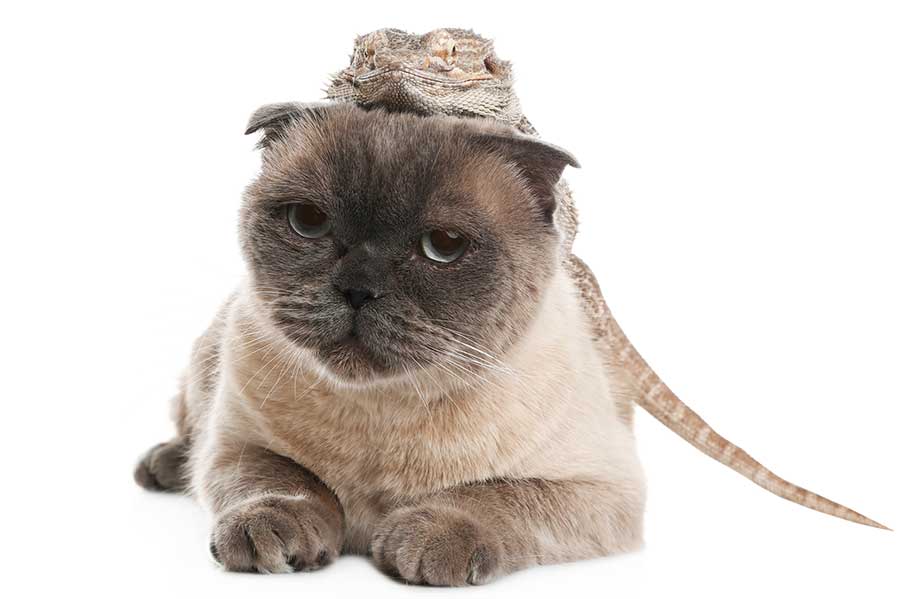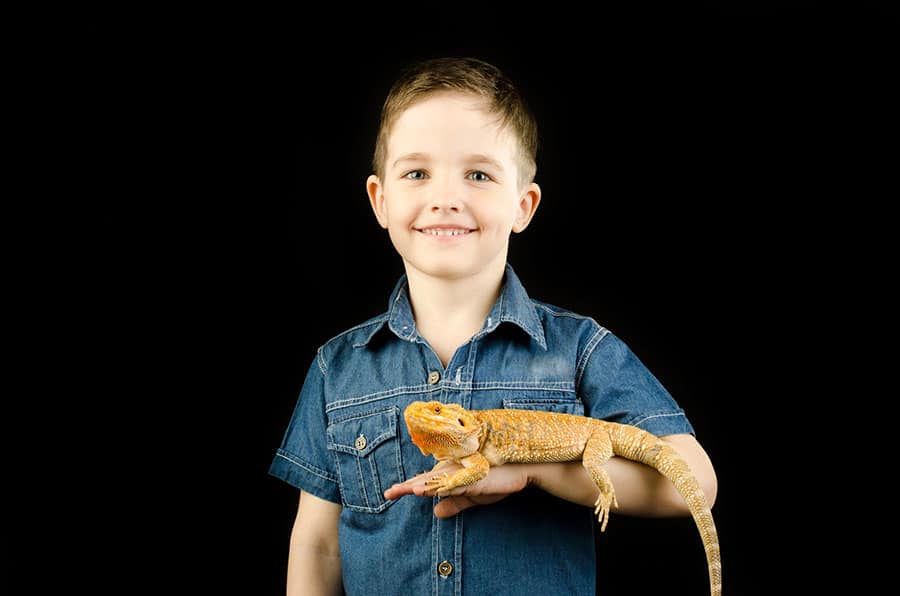They may be extremely popular lizard pets, but are bearded dragons friendly, or are they best kept as hands-off display pets?
Fortunately, bearded dragons that are bought, bred, and sold in the U.S. are all generationally captive-bred. This means the “wildness” that keeps them alive in the Australian Outback has largely been bred out of them. It also means they are much calmer and more friendly than other lizards that are wild-caught and sold in the pet trade.
Although all beardies have unique personalities to an extent, keeping a friendly bearded dragon will largely come down to how well they are cared for and how happy they are. After all, if you lived in a cramped home, ate boring food, never got exercise, or were too hot or cold all the time, you wouldn’t be too friendly, right?
The same goes for bearded dragons! The better they are cared for, the friendlier and nicer they will be.
Read on to learn more about how bearded dragons interact with different animals, other bearded dragons, and humans!
Are Bearded Dragons Friendly with Other Bearded Dragons?
Bearded dragons live alone in the wilds of Australia. They are solitary and do not live in groups. Their individual lifestyle suits them well, as they travel great distances in search of food, water, nesting areas, and mates.
The only time they come together in the wild is when they need to mate.
In captivity, you should always try to mimic their natural surroundings as closely as possible. Therefore, unless you have a very large enclosure, at least around 70 to 80 gallons, you should not keep more than one bearded dragon in a single enclosure.
If you do end up having multiple bearded dragons in a single enclosure, you’ll need to ensure they are all females or there is only one male in the group. Males are territorial and can cause enough stress to less dominant males that the submissive male can waste away and die due to stress and competition over resources like food, water, shelter, and basking spots.
The bearded dragons kept in a single enclosure should also all be of a similar size or weight to mitigate dominance issues.
If you notice any fighting or other issues, it is time to break up the band and move the troublesome bearded dragons to their own enclosures. This is sadly very common in dragons kept together, so overall, it’s best to keep them apart as soon as you are able to do so.
The key behaviors to look out for are:
- Head bobbing
- Arm waving
- Feet stamping
- Hissing/opening their mouths
- Beard puffing and body bloating
- Skin darkening
If you notice these behaviors, you will need to have a close look at the interactions between your bearded dragons. If they are particularly aggressive and territorial, then it may lead to a nasty fight or prolonged stress. Injuries can also occur.
Are They Friendly with Other Pets?
Overall, bearded dragons are not friendly with other pets. Dogs, cats, and birds are all natural predators to bearded dragons.
Your bearded dragon may experience extreme stress even if your dog or cat sits staring at it through the window!
If your pets are well-trained enough to not attack your bearded dragon, it is a happy day; however, you will never know when that primal instinct may kick in, even in the most seemingly well-behaved animals.
There are videos that circulate on the internet about cute and unlikely animal friendships that occur, and bearded dragons sometimes feature in these. However, it is important to remember that these are the exception and not the rule to bearded dragons not getting along with other pets.
At best, you’ll end up with a stressed-out beardie if you expose them to other animals. At worst, your scaly friend may end up severely injured or killed.
Are Bearded Dragons Friendly Towards Humans?
Bearded dragons can bond with their owners over time, provided there is a consistent routine of handling, bathing, and interaction.
Your bearded dragon’s enclosure will need to be in pristine working order to ensure there are no sudden changes in their temperament due to faulty UVB lights, a basking spot that is too cold, or hides that are too small or too large. Improper enclosure setups can quickly cause even the most docile beardies to become stressed and irritable.
When you start handling your bearded dragon as a juvenile, you should be able to build up a somewhat loving but definitely friendly relationship with them.
It will take time and effort from both of you, but bearded dragons are nice to have as quiet companions on your shoulder when you sit in front of the television or computer and go about your daily routine. In general, they are among the friendliest reptiles to keep as pets.
Other adults, such as family members, friends, or complete strangers should take extra care when trying to handle your bearded dragon. Beardies do bond with their owners, and it is a personal bond. This does not extend to other people.
While your beardie may forgive you for a fast movement or a bit of a squeeze, strangers should not expect the same treatment. Therefore, it is important to go over how to handle your bearded dragon carefully to ensure a comfortable and friendly encounter.
What About Children?
Bearded dragons can make excellent pets for children because of their friendly temperaments and ease of care, provided your children are mature enough to always handle them calmly and responsibly. However, very young children or kids with behavioral issues are prone to making a lot of sudden movements and loud noises, which can very easily stress out reptiles like bearded dragons.
Unfortunately, many children do not always make the best handlers and carers of bearded dragons, which can lead to some nasty bites or unfriendly behavior.
Bearded dragons also need very specific, consistent care and attention, which children can struggle to commit to. Therefore, it is important that an adult is always on hand to help out when a child starts to slack. Beardies cannot bark or meow when they have not been fed or are too cold.
Younger children may also make mistakes when handling bearded dragons. They may squeeze, pull on tails, or accidentally drop a bearded dragon and cause it harm, which will lead to unfriendly behavior.
However, bearded dragons love cuddles, love to play, and are very friendly with children when they are cared for correctly. It is up to the adult in the situation to carefully explain how to interact with a bearded dragon correctly to ensure a friendly encounter.
FAQs About Pet Beardies
Do bearded dragons like to be walked like other animals?
The answer to this question is a mixed bag of reactions. Many people say that bearded dragons should not be walked because it is unnatural. However, it would technically be unnatural for dogs and cats to be walked, too, right?
You can take your bearded dragon for walks around the garden, provided they are not out of their enclosure for too long, the ambient temperature is not too hot or cold, and you are not walking them on wet ground.
Outside walks are a great way to boost mental stimulation as well as get in some good exercise and keep your beardie happy and friendly.
To avoid losing your bearded dragon in a mad dash for freedom in the outdoors, make sure they are in a secure and comfortable harness that allows them to wander and explore but also lets you keep an eye on them. Never take your eyes off them when they are outside, as they are easy targets for birds and other predators.
I could handle my bearded dragon fine last week; why won’t my bearded dragon let me handle it today?
There could be a couple of reasons for your bearded dragon suddenly not wanting to be handled. They may be shedding, which means their skin will be sensitive, and they may be in an irritable mood.
Alternatively, your beardie may be brumating, and during this time, they will not want to expend any extra energy or be moved around much. This, of course, means they won’t want to be handled.
Bearded dragons who are gravid or getting ready to mate will not want to be handled, either.
If your bearded dragon is running away or puffing up and hissing at you when you try to handle it, it does not mean it is trying to be unfriendly; it just means that your beardie is going through something and needs a little alone time.
At the Tail End of Things…
Bearded dragons are well-known and adored for their easygoing temperaments, their friendly, curious natures, and their willingness to be a cuddle buddy.
They will interact with various animals and humans in different ways depending on their surroundings, their level of socialization, their care routines, and the consideration and respect taken with handling them.
Bearded dragons are friendly and easygoing, so they make excellent pets for adults and older, responsible children. If there is an unfortunate incident of a bite or scratch, they are small enough lizards that the damage will not be severe and can usually just be shaken off.
By now, you should be in love with bearded dragons and aware of any issues that may cause them to react in an unfriendly manner. The key to having a happy, friendly beardie in your home is consistent, quality care!




